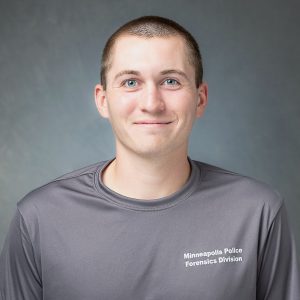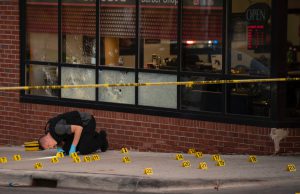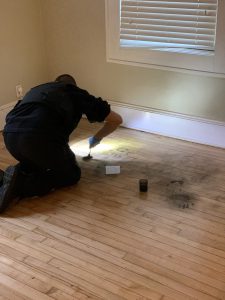
Building experience in high school can lead to future employment pathways. Meet Class of 2013 graduate Joshua VonHaugg. His interest in a forensic science career came through watching the popular television program CSI: Crime Scene Investigation. During high school, he became involved in the district’s forensic science curriculum and enrolled in the Capital Region BOCES Career & Technical Education Criminal Justice Program. Within that curriculum, he gained the tools and experience to assist with law enforcement investigations. After BKW, he received a Bachelor of Science (BS) degree in Forensic Science/Crime Scene Investigation from Hilbert College in 2017.
Fast forward to today, and you will find him as a Forensic Scientist, collaborating with detectives with the Minneapolis Police Department, assisting in investigations by documenting crime scenes and collecting evidence to assist in criminal trials. Today, we are sharing his Q&A to learn more about his pathway and his impact on the criminal justice system.
How did you begin to build your pathway towards your career in high school?

After becoming hooked on the TV show CSI, I knew I wanted to find classes and extracurricular opportunities focused on forensics. I learned early on that BKW offered a forensic science class. The teacher was enthusiastic about the subject, and offered a lot of firsthand activities, including a mock crime scene, so we could get a feel for what it was like to be an actual CSI. I then attended the Criminal Justice program at Capital Region BOCES, where I learned from a former police officer who provided great insight into the field. While there, I joined SkillsUSA, which allows students to hone their firsthand, career-readiness skills in various fields and compete in competitions, including crime scene investigation. I was part of the CSI team and competed at the regional level (placing first both years), and then competed at the state level. Outside of school, I attended a weeklong summer CSI camp hosted by SUNY Cobleskill, learning about all aspects of forensics from real professionals and participating in a mock trial.
What role do you play in assisting in law enforcement investigations?
My role as a Forensic Scientist is to document and process a crime scene and collect evidence with an objective and unbiased view of the crime or those involved. I utilize my investigative skills to identify evidence that can be collected/processed to obtain clues as to how it relates to the crime scene and if it can help determine those to whom the item may have belonged. Investigators can use this information to conduct interviews and potentially identify a suspect. Oftentimes, crimes do not have a suspect, so in my role examining fingerprints, I am sometimes the first lead that an investigator gets to determine who engaged in the crime.
What are your day-to-day responsibilities in your profession?

My day-to-day life can vary due to the types of crime scenes we have to process, and the workload we have. One day, I might be responding to multiple crime scenes back-to-back, documenting and processing evidence to assist investigators. On other days, I might be in our lab processing evidence in hopes of finding additional clues for a case. Another day may include comparing fingerprints from a crime scene to determine who they belong to. We do not have a system that automatically tells us who a fingerprint belongs to; that is, unfortunately, TV fiction.
What advice would you give to today’s high school students seeking their own career pathway?
My advice to students today is to find avenues both in and out of school related to the career you are interested in, so you can get a better understanding of that field. See if there are elective classes related to your career pathway. Seek out professionals currently in the field and ask to shadow them for a day or speak to them about what it is genuinely like to work in that career. Seeking out an internship, even while in high school, if possible, can also give you a leg up when you start applying for a job because it shows a passion for the field and that you possess the skills/experience needed to do the tasks required. More importantly though, research thoroughly into the career you are interested in. Oftentimes, that career has sub-disciplines. For example, forensic science is not just about processing a crime scene; if you love computers, you can be a computer forensic examiner. If you love chemistry or biology, you can become a forensic toxicologist, DNA analyst, or even a medical examiner, which are equally important in any investigation.

You must be logged in to post a comment.